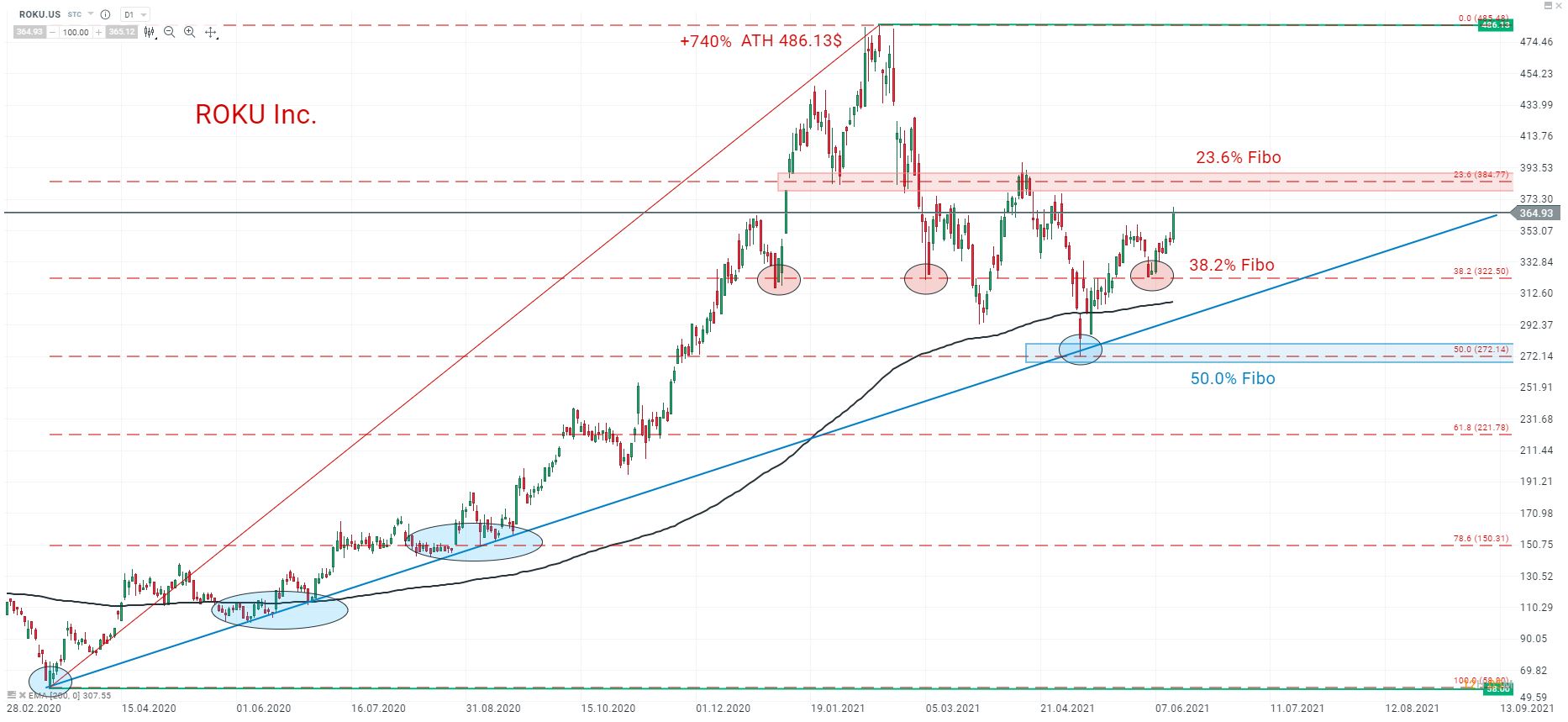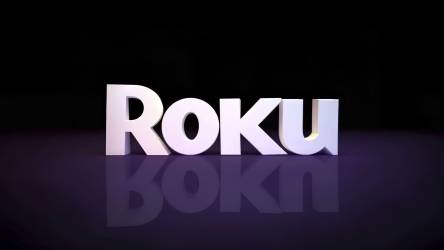Roku, Inc. (ROKU.US) is a publicly traded US company based in San Jose, California, that manufactures a variety of digital media players for video streaming. Roku has an advertising business and also licenses its hardware and software to other companies. The Roku video streaming platform is the gateway to Internet television for many consumers. Investors have realized its key position, especially as more people have used its service during the Covid-19 pandemic.
Origins
Its beginnings had its origins as a unit of another large company in the sector, Netflix, and it manufactured the company's first set-top box. But Netflix decided that it wanted to be hardware independent, so it got rid of the business in 2007. Recall that Netflix originally rented DVD movies over the internet, until it was developed as a virtual platform years later.
After the sale, Roku continued to manufacture set-top boxes and also added streaming devices to allow consumers to access Internet video services such as Netflix, Hulu, or Amazon Prime Video among others. Later, it licensed its operating system to Smart TV manufacturers.
Fundamentals
Today, Roku makes most of its revenue by selling advertising on its platform, including ads from ad-supported services, such as its own Roku channel. Additionally, it earns a large chunk of subscription and PPV revenue from third-party services sold through its platform. Roku's shares are considered to be tied to the exchange of television advertising dollars and streaming from traditional broadcast and cable services.
Consumers are increasingly turning to free and ad-supported internet video networks for their entertainment. Roku saw the trend towards ad-supported video on demand coming, while others focused on subscription video on demand. He knew that consumers would reach a limit on the number of services they would be willing to pay for, due to their budget and the large supply of alternatives. He analyzed that consumers are willing to consume advertising, as long as access to content is free.
The analyst consensus sees Roku's strategy as playing a key role in the trend toward "cable cutters" and "never off" (people who cancel or never subscribe to traditional pay-TV services).
In its latest report, Roku declared 53.6 million active user accounts, 2.4 million more than in the quarter prior to the end of March. Although expectations place the figure at 3 million new user accounts. While average revenue per user rose to $ 32.14 in the first quarter, 32% more than in the same quarter last year.
To date, Roku's user growth has come primarily from the US and Canada. Although it has recently started its process of international expansion. Today it operates in more than 20 countries, including the UK, Mexico and Brazil. Roku continues to benefit from new releases on other video streaming platforms, Disney +, AppleTV +, Peacock, HBO Max, and Paramount+.
Due to the broad spectrum of Roku's business across Smart TVs and mobile devices, it is a logical partner for third-party streaming services. For us to understand each other, Roku offers third-party platform compatibility on both mobile devices and Smart TVs, making it an intermediary in the digital entertainment sector in a quasi-monopolistic situation.
Because Roku is in growth mode, it has been operating at a loss as it invests in international expansion and its ad-supported video on demand services.
However, on May 6, it posted a surprise profit for the first quarter. It was the second consecutive quarter with profitability for the company. Roku earned $ 0.54 per share on sales of $ 574.2 million at the end of March, when expectations were that it would post a loss of $ 0.13 per share on sales of $ 490.6 million. In the same period of 2020, the company reported losses of $ 0.45 per share with sales of $ 320.8 million. The difference between one year and another is substantial.
The company's platform business, primarily driven by advertising, accounted for 81% of revenue in the March quarter. While the Roku device contributed the remaining 19% of sales.
Technical analysis
Since the February 2020 correction, where it reached a minimum of $ 58 per share, the company exponentially increased its price as its fundamentals took advantage of the situation due to the pandemic, to reach, in one year, a new historical maximum at 486 , $ 13 per share, an increase of 740%!
 source: xStation
source: xStation
The halt suffered in streaming companies due to the improvements in the economy, the reopening of borders and the lifting of confinements made investors lose interest in this sector, which corrected strongly until it reached a minimum of support in line with the bullish guideline (blue line) that has accompanied the price during the last year. The correction stopped right in line with the support and the 50% fibo signal of the 2020 rally.
On several occasions, the company found local support at 38.2% fibo, including the recent bullish momentum to consolidate the $ 322.5 level. Currently, it has a target of 23.6% fibo, from which, if it continues with the recovery, it will have the ground clear to seek the all-time highs again at $ 486.13 per share.
Darío García
XTB Spain
Gazdasági naptár: Kiskereskedelmi eladások Kanadából; UoM adatok az USA-ból
BREAKING: Az EURGBP esik a brit munkaerő-piaci adatok után ✂️
Gazdasági naptár: amerikai munkaerő-piaci adatok és előzetes PMI-jelentések 🔎
Reggeli összefoglaló (16.12.2025)
Ezen tartalmat az XTB S.A. készítette, amelynek székhelye Varsóban található a következő címen, Prosta 67, 00-838 Varsó, Lengyelország (KRS szám: 0000217580), és a lengyel pénzügyi hatóság (KNF) felügyeli (sz. DDM-M-4021-57-1/2005). Ezen tartalom a 2014/65/EU irányelvének, ami az Európai Parlament és a Tanács 2014. május 15-i határozata a pénzügyi eszközök piacairól , 24. cikkének (3) bekezdése , valamint a 2002/92 / EK irányelv és a 2011/61 / EU irányelv (MiFID II) szerint marketingkommunikációnak minősül, továbbá nem minősül befektetési tanácsadásnak vagy befektetési kutatásnak. A marketingkommunikáció nem befektetési ajánlás vagy információ, amely befektetési stratégiát javasol a következő rendeleteknek megfelelően, Az Európai Parlament és a Tanács 596/2014 / EU rendelete (2014. április 16.) a piaci visszaélésekről (a piaci visszaélésekről szóló rendelet), valamint a 2003/6 / EK európai parlamenti és tanácsi irányelv és a 2003/124 / EK bizottsági irányelvek hatályon kívül helyezéséről / EK, 2003/125 / EK és 2004/72 / EK, valamint az (EU) 2016/958 bizottsági felhatalmazáson alapuló rendelet (2016. március 9.) az 596/2014 / EU európai parlamenti és tanácsi rendeletnek a szabályozási technikai szabályozás tekintetében történő kiegészítéséről a befektetési ajánlások vagy a befektetési stratégiát javasló vagy javasló egyéb információk objektív bemutatására, valamint az egyes érdekek vagy összeférhetetlenség utáni jelek nyilvánosságra hozatalának technikai szabályaira vonatkozó szabványok vagy egyéb tanácsadás, ideértve a befektetési tanácsadást is, az A pénzügyi eszközök kereskedelméről szóló, 2005. július 29-i törvény (azaz a 2019. évi Lap, módosított 875 tétel). Ezen marketingkommunikáció a legnagyobb gondossággal, tárgyilagossággal készült, bemutatja azokat a tényeket, amelyek a szerző számára a készítés időpontjában ismertek voltak , valamint mindenféle értékelési elemtől mentes. A marketingkommunikáció az Ügyfél igényeinek, az egyéni pénzügyi helyzetének figyelembevétele nélkül készül, és semmilyen módon nem terjeszt elő befektetési stratégiát. A marketingkommunikáció nem minősül semmilyen pénzügyi eszköz eladási, felajánlási, feliratkozási, vásárlási felhívásának, hirdetésének vagy promóciójának. Az XTB S.A. nem vállal felelősséget az Ügyfél ezen marketingkommunikációban foglalt információk alapján tett cselekedeteiért vagy mulasztásaiért, különösen a pénzügyi eszközök megszerzéséért vagy elidegenítéséért. Abban az esetben, ha a marketingkommunikáció bármilyen információt tartalmaz az abban megjelölt pénzügyi eszközökkel kapcsolatos eredményekről, azok nem jelentenek garanciát vagy előrejelzést a jövőbeli eredményekkel kapcsolatban.


